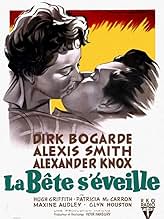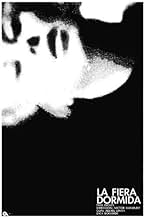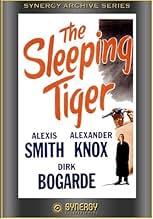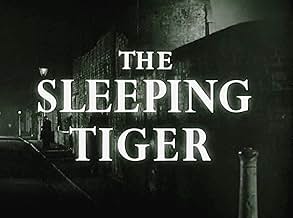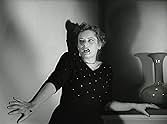AVALIAÇÃO DA IMDb
6,5/10
1,4 mil
SUA AVALIAÇÃO
Depois que um condenado entra na casa de um psicoterapeuta, ele concorda em iniciar uma reabilitação em vez de ser acusado pela polícia, mas tudo muda quando a esposa do terapeuta se apaixon... Ler tudoDepois que um condenado entra na casa de um psicoterapeuta, ele concorda em iniciar uma reabilitação em vez de ser acusado pela polícia, mas tudo muda quando a esposa do terapeuta se apaixona pelo condenado.Depois que um condenado entra na casa de um psicoterapeuta, ele concorda em iniciar uma reabilitação em vez de ser acusado pela polícia, mas tudo muda quando a esposa do terapeuta se apaixona pelo condenado.
- Direção
- Roteiristas
- Artistas
- Prêmios
- 1 indicação no total
Jimmy Charters
- Jazz Club Patron
- (não creditado)
Martin Lyder
- Jazz Club Patron
- (não creditado)
John Lynn
- Jazz Club Patron
- (não creditado)
Ross Parker
- Barman
- (não creditado)
Jim Tyson
- Jazz Club Patron
- (não creditado)
Harry Van Engel
- Spectator at crash
- (não creditado)
- Direção
- Roteiristas
- Elenco e equipe completos
- Produção, bilheteria e muito mais no IMDbPro
Avaliações em destaque
Joseph Losey, working under a pseudonym after his blacklisting, didn't want to make this overbaked British melodrama. And who can blame him, given the heavy-breathing histrionics of the screenplay, a ridiculous concoction about a psychiatrist and his sexually frustrated wife harboring a hoodlum. The plot turns are unconvincing, the music hilariously overblown, and Alexander Knox, as the shrink, terminally uninteresting.
What makes this mess watchable is its game imitation of American noir tropes (dark alleys, femmes fatales, car chases), and some good very early rock-and-roll/jazz in the pub sequences. Also, the film can be viewed as a warmup for the later Losey-Bogarde collaborations, which explored similar themes (guilt, moral ambiguity, the nature of evil) much more expertly.
What makes this mess watchable is its game imitation of American noir tropes (dark alleys, femmes fatales, car chases), and some good very early rock-and-roll/jazz in the pub sequences. Also, the film can be viewed as a warmup for the later Losey-Bogarde collaborations, which explored similar themes (guilt, moral ambiguity, the nature of evil) much more expertly.
Even his staunchest devotees would have to acknowledge that the films of Joseph Losey are notoriously uneven. This one is of interest to Losey completists as it marks his first film in England although sadly, for reasons which have been well documented, both he and adaptors Foreman and Buchman were 'fronted' in the credits.
Losey has done his very best with the melodramatic material at his disposal and has given the film an edginess unusual for the time. There is a palpable sexual tension(surprisingly enough) between the psychotherapist's wife of Alexis Smith and the case for treatment of Dirk Bogarde. It must be said that Bogarde was never really convincing as a heart-throb and here relishes the chance to be menacing. Alexis Smith, cast for the American market, has an extremely challenging role which obliges her to run the gamut and being a thorough professional she surmounts whatever the script throws at her. Her character, like the film itself, goes off the rails at the end but I'm sure that Esso Oil was grateful for the free advertising. Mention must be made of Alexander Knox who navigates the psychobabble and delivers his customarily solid performance.
Whether Losey had a choice of composer for this is debatable but unlike most of his films in which the music is extremely irritating, Malcolm Arnold's powerful score here is spot on and aids the film immeasurably whilst Harry Waxman is a good choice as cinematographer, having previously shot 'Brighton Rock'.
This opus might not have represented the most auspicious start to the Losey/Bogarde collaboration but they could only get better and with the notable exception of 'Modesty Blaise', they most certainly did.
Losey has done his very best with the melodramatic material at his disposal and has given the film an edginess unusual for the time. There is a palpable sexual tension(surprisingly enough) between the psychotherapist's wife of Alexis Smith and the case for treatment of Dirk Bogarde. It must be said that Bogarde was never really convincing as a heart-throb and here relishes the chance to be menacing. Alexis Smith, cast for the American market, has an extremely challenging role which obliges her to run the gamut and being a thorough professional she surmounts whatever the script throws at her. Her character, like the film itself, goes off the rails at the end but I'm sure that Esso Oil was grateful for the free advertising. Mention must be made of Alexander Knox who navigates the psychobabble and delivers his customarily solid performance.
Whether Losey had a choice of composer for this is debatable but unlike most of his films in which the music is extremely irritating, Malcolm Arnold's powerful score here is spot on and aids the film immeasurably whilst Harry Waxman is a good choice as cinematographer, having previously shot 'Brighton Rock'.
This opus might not have represented the most auspicious start to the Losey/Bogarde collaboration but they could only get better and with the notable exception of 'Modesty Blaise', they most certainly did.
Dirk Bogarde attempts to mug Alexander Knox at gunpoint in a dark London street. Knox overcomes him by twisting his arm. Next, Alexis Smith, Knox's wife, comes home from a trip to Paris, sees Bogarde in her house, assumes he is one of her psychiatrist husband's patients, but is told that he is a criminal who is living under her roof for six months as an experiment in criminal rehabilitation which her husband is carrying out as a humane alternative to sending the young man to jail. She accepts the arrangement with barely a shrug. Bogarde immediately proceeds to verbally and physically abuse the house maid and act rudely toward Smith. Yet for some reason she is attracted to him and soon they are having a hot affair under the husband's nose. And on and on it goes. One startling development after another. There are elements of the overly simplistic psychiatric rehab genre reminiscent of Hollywood classics like Now, Voyager and Spellbound but with a more realistic look and feel. The music is intense and draws attention to itself, from the cacophonous noise that Smith listens to on her home record player to the sizzling live jazz at the Soho dive where she goes to loosen up with her secret lover. Bogarde is supposed to be a low-life criminal but his polished accent and genteel mannerisms seem thoroughly middle-class and this is never explained. Alexander Knox seems made of wood yet is somehow believable as the kind of intellectually preoccupied and unflappable person who just might come up with the idea of inviting a mugger into his home as an eccentric form of research. And Smith, icily self-contained at the beginning, gradually gets a chance to do some dynamic emoting. She's very good in this. The title of the film symbolizes the wild impulses that sleep within us, waiting to be awakened. From the 2007 vantage point there are no important or original social or intellectual insights here but the way the film is edited, photographed and scored are deliberately jarring without distracting from the film's intent. Losey wants to shake us up and he succeeds.
It's just a bit too much. The good doctor is attacked at gunpoint. He disarms the bad guy, then brings him home to dinner, where his high strung wife spars with the guy. Of course, the two eventually begin a movie long tryst. Dirk Bogarde is a bad boy who is a bundle of anger. He usually gets what he wants but carries more baggage than a porter at an airport. Alexis Smith is the femme fatale. She is older and bored with her psychologist husband, who is determined to resurrect the lad. He is willing to allow this man to do whatever he wants: bringing women to the house, bossing around the help, robbing jewelry stores and businesses. He is pursued by a cop who is on to him but has respect for the doctor and backs off on an arrest. It's hard to believe that this man should give a rip about Bogarde, but somehow he's willing to withdraw. The weakest part of the movie is when it all falls into place. It's so pat. A contemporary film would have built the house a card at a time; this happens in milliseconds. Then we have the denouement which I will not spoil. Let me just say it was a disappointment. The movie is visually sharp and the acting is pretty good. I never really like Alexis Smith much and she is a little grating here. Still, it's a decent performance and the subject is a little ahead of its time.
Alexis Smith was one of many American stars who came to the United Kingdom to
find work which was becoming less and less in Hollywood as less feature films were being made.. She was lucky to get this role opposite rising British cinema
favorite Dirk Bogarde.
Smith plays the wife of criminal psychologist Alexander Knox who believes that with some analysis some criminals can be cured. So far not different than those two Hollywood classics Blind Alley and The Dark Past. But in those cases criminals broke into the homes of psychologists Ralph Bellamy and Lee J. Cobb and under stress the two mental health professionals did some probing.
But Bogarde is a selected case study. He's paroled to Knox and gets to live in his home where Smith finds the sexy Bogarde impossible to resist.
Bogarde is Stanley Kowalski with a criminal record if this film had been made on this side of the pond Marlon Brando would have been an obvious choice for the part. Let's say that Knox should have kept his business and professional life separate. Smith is great as a forty something woman in some serious heat.
One person I always enjoy seeing in British films is Hugh Griffith who always brings something to even a relatively colorless part like a police inspector here.
Blacklisted director Joseph Losey directed The Sleeping Tiger and it's a fine piece of work
Smith plays the wife of criminal psychologist Alexander Knox who believes that with some analysis some criminals can be cured. So far not different than those two Hollywood classics Blind Alley and The Dark Past. But in those cases criminals broke into the homes of psychologists Ralph Bellamy and Lee J. Cobb and under stress the two mental health professionals did some probing.
But Bogarde is a selected case study. He's paroled to Knox and gets to live in his home where Smith finds the sexy Bogarde impossible to resist.
Bogarde is Stanley Kowalski with a criminal record if this film had been made on this side of the pond Marlon Brando would have been an obvious choice for the part. Let's say that Knox should have kept his business and professional life separate. Smith is great as a forty something woman in some serious heat.
One person I always enjoy seeing in British films is Hugh Griffith who always brings something to even a relatively colorless part like a police inspector here.
Blacklisted director Joseph Losey directed The Sleeping Tiger and it's a fine piece of work
Você sabia?
- CuriosidadesWhen this movie first appeared, the direction was credited to Victor Hanbury, a real-life Producer, who only agreed to take the credit when the actual Director, the blacklisted Joseph Losey, insisted that this would be a great help to him, as he needed the work. Although several versions of this movie, including the DVD, still credit Hanbury, there are prints where Losey is credited under his own name. The first several times it was shown on British television, in the late 1960s and early 1970s, Losey had the credit.
- Erros de gravaçãoAngry that Frank has left her Glenda wearing a black dress runs from the house, jumps in her car and drives off. Spotting Frank (Dirk Bogarde) walking along the road she stops and picks him up but she's now wearing a coat.
- Citações
Glenda Esmond: You're not going to give me notice, like a servant or a waitress!
- ConexõesFeatured in Joseph Losey: The Man with Four Names (1998)
Principais escolhas
Faça login para avaliar e ver a lista de recomendações personalizadas
- How long is The Sleeping Tiger?Fornecido pela Alexa
Detalhes
- Data de lançamento
- Países de origem
- Idioma
- Também conhecido como
- The Sleeping Tiger
- Locações de filme
- William Mansell, 24 Connaught Street, Londres, Inglaterra, Reino Unido(Smash & Grab 27 minutes from start)
- Empresas de produção
- Consulte mais créditos da empresa na IMDbPro
- Tempo de duração1 hora 29 minutos
- Cor
- Proporção
- 1.37 : 1
Contribua para esta página
Sugerir uma alteração ou adicionar conteúdo ausente

Principal brecha
By what name was O Monstro de Londres (1954) officially released in India in English?
Responda
